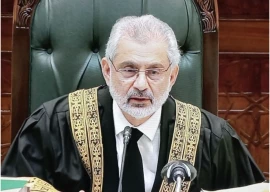
The Pakistan Peoples Party (PPP) has proposed cutting the tenure of the ruling Pakistan Muslim League-Nawaz by a year – offering it up as a solution to end the bitter dispute between the Pakistan Tehreek-e-Insaf (PTI) and Prime Minister Nawaz Sharif’s party over alleged electoral fraud.
“The government’s tenure should be reduced from five to four years,” suggested Leader of the Opposition in the National Assembly Syed Khursheed Ahmed Shah on Tuesday.
Addressing the media in his chamber at Paliament House, Shah said the incumbent government should complete its five-year tenure and an amendment should subsequently be introduced to allow for four-year tenures. “Once this is done, all disputes will be settled,” Shah claimed. He said the tenure could be increased once more to five years once democratic rule is strengthened in the country.
The PPP was the first democratically elected government to complete its tenure in Pakistan, ruling from 2008-2013.
Shah floated the idea in a set of proposals forwarded to National Assembly speaker on behalf of the Parliamentary Committee on Electoral Reforms that is expected to take shape once the 33 members of the committee are finalised.
The committee was set up by the speaker after Prime Minister Nawaz Sharif sent him a letter asking the parliamentary committee to review existing election legislation and to come up with proposals to ensure transparency in the electoral process.
Shah claimed that proposals for electoral reform and strengthening the hand of democracy in the country have been chalked out after thorough consultation.
Chief election commissioner
Discussing electoral reform, the opposition leader said the chief election commissioner (CEC) must be empowered to play a more effective role. Article 213 (2) reads, “No person shall be appointed to be Commissioner unless he is, or has been, a Judge of the Supreme Court or is, or has been, a Judge of a High Court and is qualified under paragraph (a) of clause (2) of Article 177 to be appointed a Judge of the Supreme Court.”
Shah claims that this clause limits options. “If we can’t find a suitable judge, where do we get a CEC?” he asked. He called for constitutional amendments that would allow senior lawyers and bureaucrats to be eligible for the post of CEC.
Former CEC Justice (retd) Fakhruddin G Ebrahim resigned from the office immediately after the presidential elections. Justice Anwar Zaheer Jamali recently took oath as the 31st acting CEC. Justice Jamali took over from Justice Nasirul Mulk, who resigned on Monday as acting CEC after his appointment as Chief Justice of Pakistan with effect from July 6.
The PM has also initiated the process of consultation with the opposition leader for the appointment of a CEC.
Published in The Express Tribune, July 9th, 2014.
COMMENTS (9)
Comments are moderated and generally will be posted if they are on-topic and not abusive.
For more information, please see our Comments FAQ











































I think regardless of the context this is a very good proposal. 4 years is genuinely a good term for voters to assess a government and there is nothing that can change in the 5th year if the 4 years didn't show any positive return from the incumbents. Most of the democracies in the world have 4 year terms. In a place like Pakistan where the patience runs thin within a year of the elections reducing the duration to 4 years will probably weigh down some of the anti-government agendas.
Anything that can break current deadlock must be welcomed.
Why did wadera corruption party thugs not cut short five years to four years when they looted and destroyed this country to its last bone during their five cursed years during which they day and night howled Hum apnay paanch saal puray karain ge. Wadera corruption party is the bane of existence for this country and Karachi
Politicians deviating into sense
Cut the tenure by one year?!?! That means 365 less days to loot and plunder! Why in the heck would someone from the self-proclaimed Mughal-e-Azams of Lahore want that? How silly of you Mr. Khursheed Shah (now that you've had your turn)....
Done and done. If only solving all our issues was so simple! How are these buffoons in charge of this potentially great nation? Lets not look at the allegations of fraud and systemic issues in the electoral process and instead cut short the tenure of an ostensibly democratic government to appease one vocal opposition critic.
Me thinks the PPP is concerned more with letting sleeping dogs lie than breaking any deadlock.
Why this suggestion never come in PPP Government???? ;)
The amendments regarding CEC to which Khurshid Shah is objecting to now were made with much fanfare by the PPP/PML(N) duo to make the EC independent through 18th amendment to the constitution.It means that the amendments were made without studying its 'pros and cons' and with malafide intentions. Also the devolving of Education,Health and some other subjects totally to the provinces has already made the life of common man extremely miserable.Even the suggestion of 4 years tenure of government is malacious,he wants the present ruling party to complete 5 years of stipulated rule but wants 4 years tenure for the next government knowing fully well that both PPP/PML(N) are least likely to form the next government.And above all keeps the option to increase the tenure to 5 years when they come to power again.Nothing meaning full is expected from these two parties and their leadership.
Reduction of government’s tenure from five to four years is a good idea. All political parties should be taken on board to approve this amendment. But it should be applied on the next parliament and government. Hope that it will make rulers serve people more and work for their betterment at fast pace. Opposition will not try to derail system, as it will have to wait less for next elections. All parties will try to perform better to have advantage in next polls.